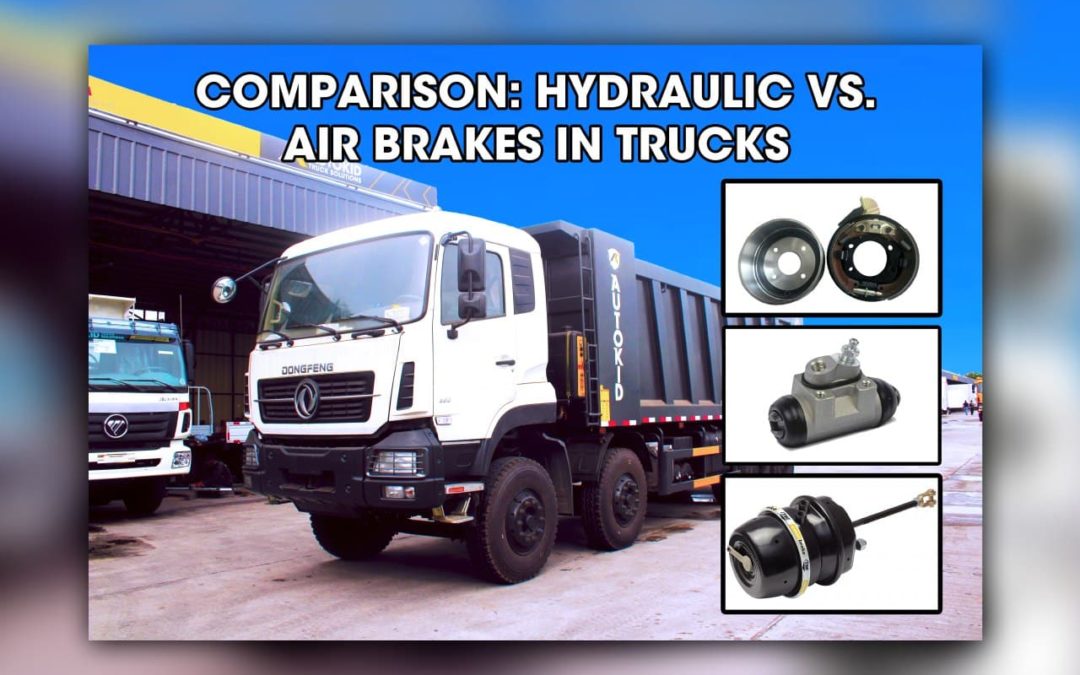Are air brakes better than hydraulic brakes? Air brakes are better than hydraulic brakes for heavy vehicles due to their superior stopping power and reliability. They provide consistent performance in various conditions, making them a preferred choice for commercial vehicles and large trucks.
In comparison, hydraulic brakes are more commonly used in smaller vehicles and offer responsive braking but may not be as effective for heavy-duty applications. Understanding the differences between air and hydraulic brakes is essential for selecting the most suitable braking system for specific vehicle requirements.
This article will explore the key advantages and disadvantages of air brakes and hydraulic brakes, shedding light on their functionality, maintenance, and overall performance. Specifically, we will answer the question, Are air brakes better than hydraulic brakes? Whether you are a driver, mechanic, or simply interested in vehicle technology, gaining insights into the benefits and limitations of these braking systems can enhance your understanding of automotive safety and engineering.
Air Vs Hydraulic Brakes Face-off
When it comes to deciding between air brakes and hydraulic brakes for your vehicle, there are several factors to consider. Each type of brake system has its own set of advantages and disadvantages, making it essential to understand the core differences to make an informed decision. In this article, we will delve deep into the comparison of air vs hydraulic brakes, examining their components and operational mechanisms.
Understanding The Core Differences
Components And Operational Mechanisms
The composition and functionality of air brakes set them apart from hydraulic brakes. As the name suggests, air brakes operate using compressed air, which is stored in a reservoir. When the driver applies the brake pedal, the air pressure is released, causing the brake shoes to engage with the wheels and slow down the vehicle.
This leads to the question: Are air brakes better than hydraulic brakes? This system relies on a network of valves and hoses to distribute the compressed air to the brakes on each wheel. This setup ensures efficient and responsive braking, especially for heavy-duty vehicles carrying substantial loads.
Understanding The Core Differences
Components And Operational Mechanisms
Air Brakes Explained
When it comes to heavy-duty vehicles, the debate between air brakes and hydraulic brakes has been ongoing. In this section, we will delve into why air brakes are the preferred choice for heavy-duty vehicles, and the unique benefits they offer. Let’s start by understanding the composition and functionality of air brakes.

Composition And Functionality
The composition and functionality of air brakes set them apart from hydraulic brakes. As the name suggests, air brakes operate using compressed air, which is stored in a reservoir. When the driver applies the brake pedal, the air pressure is released, causing the brake shoes to engage with the wheels and slow down the vehicle.
This leads to the question: Are air brakes better than hydraulic brakes? This system relies on a network of valves and hoses to distribute the compressed air to the brakes on each wheel. This setup ensures efficient and responsive braking, especially for heavy-duty vehicles carrying substantial loads.
Unique Benefits For Heavy-duty Vehicles
Air brakes offer unique benefits specifically tailored for heavy-duty vehicles. The use of compressed air allows for consistent and reliable braking performance, even in challenging conditions such as steep descents or high temperatures.
Furthermore, the design of air brakes enables them to disperse heat more effectively than hydraulic brakes, making them ideal for heavy vehicles that frequently undergo intense braking. This characteristic ensures that the braking system maintains its efficiency over prolonged periods of heavy use.
Hydraulic Brakes Demystified
System Design And Usage
Are air brakes better than hydraulic brakes? Hydraulic brakes utilize fluid pressure to transfer force from the brake pedal to the brake pads or shoes. This system consists of a master cylinder, brake lines, and calipers or wheel cylinders. When the brake pedal is pressed, the master cylinder forces hydraulic fluid through the brake lines, ultimately causing the calipers or wheel cylinders to push the brake pads or shoes against the rotor or drum, creating the necessary friction to stop the vehicle.
Advantages In Certain Settings
In comparison to air brakes, hydraulic brakes offer several advantages in specific settings. They are more compact and lighter, making them preferable for smaller vehicles and applications where weight is a critical factor. Additionally, hydraulic brakes provide more immediate response and are better suited for stop-and-go driving, such as in city environments. They also require less maintenance and are generally easier to service than air brakes, making them a popular choice for many vehicle manufacturers and fleet operators.
The Ultimate Comparison: Air Brakes Better?
When it comes to the debate of are air brakes better than hydraulic brakes, determining which system is superior depends on numerous factors. In this comprehensive comparison, we will assess the performance, safety, reliability, and maintenance contrasts between air and hydraulic brakes, aiming to unveil which one reigns supreme in various conditions.

Assessing Performance Under Various Conditions
Are air brakes better than hydraulic brakes? Performance is a critical aspect when comparing air brakes and hydraulic brakes. When it comes to stopping power, air brakes offer superior performance, particularly in larger vehicles and heavy-duty applications. They provide consistent and more reliable stopping power, especially in wet conditions, whereas hydraulic brakes may experience reduced performance due to moisture or air in the system.
On the other hand, hydraulic brakes are known for their responsiveness and better modulation. In light-duty vehicles and everyday driving scenarios, hydraulic brakes offer a more responsive and smoother braking experience. However, they may be subject to heat fade during prolonged or intense braking.
Safety, Reliability, And Maintenance Contrasts
When it comes to safety, both air and hydraulic brake systems have their respective advantages. Air brakes are renowned for their safety features, such as the ability to apply braking force independently to each axle, ensuring more effective braking and stability. Additionally, air brakes operate more reliably when it comes to long descents, reducing the risk of brake fade.
Hydraulic brakes, on the other hand, are generally simpler in design and easier to maintain. They offer quieter operation and are less prone to leaks and air contamination. The familiar feel and modulation make them a preferred choice for many drivers. However, the necessity for regular fluid checks and potential for hydraulic system failure warrant careful monitoring.
Choosing Between Air And Hydraulic Brakes
There are several factors to consider when choosing between air and hydraulic brakes for a vehicle. The type of vehicle, its intended use, and specific operational requirements all play a key role in determining which braking system is most suitable. For heavy-duty commercial vehicles, air brakes are often preferred due to their superior stopping power and reliability. On the other hand, vehicles with lighter payloads or those operating in more compact areas may find hydraulic brakes to be more advantageous.
When it comes to environmental and economic considerations, hydraulic brakes have the advantage of being more cost-effective to maintain and repair. They also tend to be more fuel-efficient, thereby contributing to reduced emissions and overall environmental impact. Air brakes, while offering robust performance, may incur higher initial costs and require more intricate maintenance procedures. However, their durability and extended lifespan can ultimately lead to long-term cost savings.

Credit: www.autokid.com.ph
Frequently Asked Questions For Are Air Brakes Better Than Hydraulic Brakes
Are Air Brakes Better For Heavy Vehicles?
Yes, air brakes are more efficient for heavy vehicles due to their ability to provide consistent braking power, especially in long descents. The air-operated system enables uniform distribution of braking force across all wheels, enhancing safety and control.
How Do Hydraulic Brakes Compare To Air Brakes?
Hydraulic brakes are more common in light vehicles due to their simpler design and cost-effectiveness. However, air brakes are superior for heavy vehicles as they offer better cooling and a fail-safe design, making them ideal for demanding applications.
What Are The Advantages Of Air Brakes Over Hydraulic Brakes?
Air brakes offer superior stopping power, particularly in heavy-duty applications, and are less prone to brake fade. Their fail-safe design and the ability to maintain pressure even in case of system leakage make them a preferred choice for commercial vehicles.
Can Air Brakes Improve Braking Control And Safety?
Yes, air brakes provide better control and safety for heavy vehicles. Their ability to deliver consistent braking force and withstand higher temperatures reduces the risk of brake failure and enhances overall vehicle safety on the road.
Conclusion
In the battle of air brakes versus hydraulic brakes, it’s clear that both have their strong points. While air brakes offer better cooling and are more suitable for heavy-duty vehicles, hydraulic brakes provide a more responsive and cost-effective solution for lighter vehicles. So, are air brakes better than hydraulic brakes? Ultimately, the choice depends on the specific needs and requirements of the vehicle in question.
